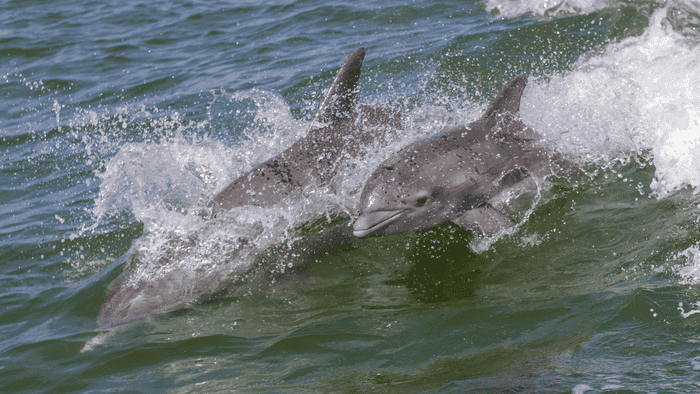
The National Oceanic and Atmospheric Association is offering a reward of up to $20,000 for info that would lead them to the person(s) responsible for killing a pair of dolphins in Naples, Florida.
A dead dolphin was discovered off the coast of the southwestern Florida city by biologists with the state's Fish and Wildlife Conservation Commission just last week. Officials for that commission said that the animal was found dead with what appeared to be wounds from a bullet and sharp object.
In the same week, another dolphin was found dead with a bullet in its left side. That animal was located by experts from the Emerald Coast Wildlife Refuge along Pensacola Beach, which sits on the Florida panhandle, a.k.a. pretty much the opposite side of the state.
These dolphins' deaths follow the discovery of another one of their brethren, who was found with a fatal puncture wound on its head in May of 2019. There's an open reward for info in that investigation, as it's still ongoing.
Biologists believe that the deaths are a result of humans feeding wild dolphins, and those dolphins (in turn) associating people/boats with food. This leads to dolphins following boats and begging for food, which can put them in a dangerous position.
"I think it’s really hard for a lot of people to see how a simple thing like feeding a dolphin can lead to shocking and egregious behavior like this," said NOAA bottlenose dolphin expert, Stacey Horstman. "They don’t think about it when they feed them."
For the unaware, feeding or harassing dolphins is a violation of federal law that could bring about a punishment of a year in jail or a $100,000 fine.
"These cases can rarely be solved without the public, people coming forward and saying they might have seen something and we can follow up on that," said the assistant director of NOAA's Southeast law enforcement division, Tracy Dunn.
As for what your approach should be if, say, you're a tourist.
"Stay approximately 50 yards away from viewing dolphins in the wild, and that’s your best bet for not impacting them," Horstman said, according to USA TODAY. "[P]ut the boat engine in neutral. If the dolphin is begging, do not try to engage with that animal in any way."
In the extremely rare case that you somehow know something about this, the NOAA wildlife hotline can be reached at (800) 853-1964.
